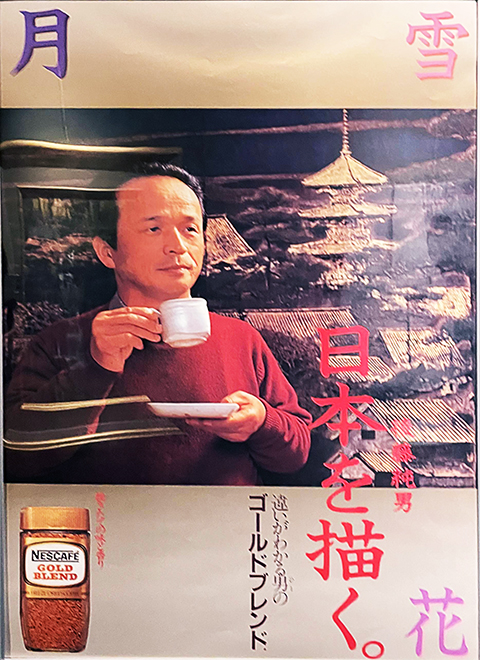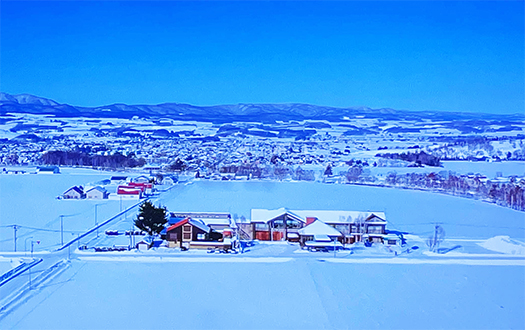
わたしは美術鑑賞というと基本的には「日本画」がメイン。東京では山種美術館がベースキャンプ的な存在で、だいたい展示替えがある度に鑑賞するのが習慣化しています。
やはり自分の性向として絵画・美術がいちばん根の部分にあるのだと思っています。そういう人間として日本人が感じてきた「美感」の歴史みたいな部分への探究心が強くて、どうしても日本画が中心になっていくのだろうと思っています。京都高山寺の「鳥獣戯画」も高山寺に参観に行って観てきたので、いまちょうど北海道立近代美術館で展覧会については、もう見ているけれど一応と、参観に行ったのですが待ち時間が数時間と聞いてさすがに断念した。
こうした日本画について北海道内では、唯一に近い存在として上富良野にこの美術館はある。これまでも数回このブログでも紹介していますが、往復では250kmくらいのドライブになるので、さすがに加齢と共にややツラくなっていたのですが、連休でもあり今回また訪問。
作家は日本画を追求していく中で、北海道の自然に深くこだわられて、その雄大な自然造形を描くなかで神々しいまでの体験をしたと述べられている。
氏は現・千葉県野田市の真言宗寺院に生まれて、父君のみちびきで奈良京都の古刹寺院に宿泊しながら絵を描き続けていたのだという。宗教人としてそれらの建築体験がベースを形成して、それと対話するなかで、ある「視点」を獲得されたのではないか。
そういう視線で北海道の雄大な自然造形に接したとき、心理の内奥から強い感動が襲ってきたに違いない。その雄大で厳しい自然のなかに立ち尽くしながら、スケッチしていた。日本人が立ち向かったこの大地への感動を体の中に蓄積させられたのだろう。
旭川市内で氏が層雲峡などの作品について講演されたときに受講されていた上富良野町の役場のひとたちが、ぜひ現在地にアトリエをと積極的に誘致したとされる。下の写真は上富良野のこの美術館から遠く西に視線を伸ばした空撮写真。<冬期の図>

何回も行っているけれど、今回は氏の娘さんが案内役で紹介されているビデオが上映されていて、上の写真の「違いがわかる男のゴールドブレンド」という珈琲のコマーシャルに出演された経緯もユーモラスに紹介されていた。このCMは1967年に日本初のフリーズドライ製法を取り入れて発売した、ネスカフェゴールドブレンドの広告キャッチフレーズ。これ自体、50数年前という歴史の中に沈んでいるけれど、その時代の空気感がなつかしい(笑)。
日本画家として名を残したあと、こういうお茶目な側面も見せていただいた。北海道はすばらしい美術館を持っていると思います。
English version⬇
Japanese Painter Sumio Goto Museum / Kamifurano
More than 50 years have passed since the commercial “of a man who understands the difference. In this way, what Japanese people live becomes history as it is. This is the legacy of sensitivity. The Japanese Art House, Goto Sumio Museum of Art/Kamifurano
When it comes to art appreciation, my main focus is basically on Japanese-style paintings. In Tokyo, the Yamatane Museum of Art is my base camp, and I make it a habit to visit the museum whenever there is a new exhibition.
Posted on 8月 17th, 2024 by 三木 奎吾
I believe that painting and art are the most fundamental part of my nature. As a human being, I have a strong desire to explore the history of the “sense of beauty” that Japanese people have always felt, and I believe that Japanese-style paintings will inevitably take center stage in my life. I went to see the “Birds and Beasts Caricatures” at Kozanji Temple in Kyoto, and I have already seen the exhibition at the Hokkaido Museum of Modern Art, but I gave it up when I heard that the waiting time was several hours.
The museum is located in Kamifurano, which is the only place in Hokkaido where Japanese-style paintings such as these are exhibited. As I have mentioned several times in this blog, the round-trip drive is about 250 km, which has become somewhat tedious as I get older, but I visited again this time because of the consecutive holidays.
In his pursuit of Japanese-style painting, the artist was deeply attached to the nature of Hokkaido, and he says that he had a divine experience while painting its magnificent natural formations.
He was born in a Shingon Buddhist temple in Noda City, Chiba Prefecture, and continued to paint while staying at ancient temples in Nara and Kyoto under his father’s guidance. As a religious person, these architectural experiences formed the basis of his work, and he must have acquired a certain “point of view” while interacting with them.
When he came into contact with the magnificent natural formations of Hokkaido from such a perspective, he must have been strongly moved from deep within his psyche. I was sketching while standing in the midst of this magnificent and severe nature. He must have let his body accumulate the impressions of this land that the Japanese people had faced.
It is said that when he gave a lecture on his works in Sounkyo and other places in Asahikawa, the people of Kamifurano who were attending the lecture actively invited him to build his studio in the present location. The photo below is an aerial view from the museum in Kamifurano, looking far to the west.
Filed under: 日本社会・文化研究







コメントを投稿
「※誹謗中傷や、悪意のある書き込み、営利目的などのコメントを防ぐために、投稿された全てのコメントは一時的に保留されますのでご了承ください。」
You must be logged in to post a comment.